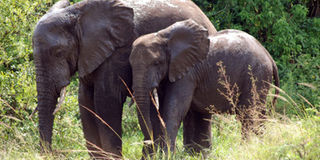Who can save Africa’s giants?

Elephants graze in the Murchison Falls National Game Park. Experts predict that if poaching is not curbed, elephants could be extinct within 10 years. Photo by Edgar R. Batte
What you need to know:
As the number of African elephants continue to dwindle, what can you, dear reader, do to avert this situation?
As elephant poaching reaches crisis point, Animal Planet (DStv Channel 183) is premiering a feature documentary: “Saving Africa’s Giants” with Yao Ming tomorrow (Sunday) night at 7pm.
The one-hour special, which is narrated by actor Edward Norton, follows former basketball star Yao Ming on his journey to Africa to see for himself the evidence of a losing battle, where Africa’s elephants are slain everyday for their tusks.
The show already premiered in China in August and it premiered in the US on Tuesday.
“People (in China) are buying ivory thinking that the elephants died of natural causes and they are not causing any problems,” the WildAid co-founder, Peter Knights, is quoted on the show, “So it’s a lot about education and it is all about fashion. So what were are trying to do is change the societal attitudes to these things.”
And it seems there could have been no better timing than now as the World Wildlife Fund says elephant poaching levels are currently at their worst in a decade, and seizures of illegal ivory are at their highest level in years.
“The syndicate of the mafias involved in this poaching cannot be underestimated,” said Geoffrey Baluku, a tourism consultant in Uganda. “They are a greedy bunch capable of emptying the world and they are a security concern.”
Global crime syndicates are intimately involved in the trade, while terrorist groups such as Joseph Kony’s Lord’s Resistance Army and Somalia’s al-Shaabab have been cited too.
Disguise?
Although China allows a small, legal trade in ivory from old stockpiles, this provides the cover for a vast, illegal trade that has fueled a new wave of poaching in Africa.
The value of elephant ivory has been on a sharp rise in recent years with a kilogramme selling for more than $2,000 (about Shs5 million), fuelling an increase in poaching.
Such are the financial incentives that hundreds of poachers and rangers have died in gunfights.
China is the biggest market, yet now, their own son once nicknamed the “Great Wall of China” aims to stop that flood through the power of persuasion.
But while Yao believes that shutting the marketplace will pretty much solve this bad trade, it is also clear that the problem is deep-rooted at the source of the goods.
The events at Uganda Wildlife Authority (UWA) last week where more than 1,300 kilogrammes of ivory went missing from the conservation body’s vaults, confirmed just how dire the situation has become.
Four UWA staff members have so far been suspended, including UWA director Robert Seguya after President Museveni ordered investigations into the missing ivory.
But former tour guide and tourism entrepreneur Amos Wekesa says the problem is more than meets the eye and he blames all Ugandans.
“Uganda’s water bodies, protected areas and wildlife in general are on their knees and UWA has failed,” said Wekesa. “If you ask for ‘charcoal’ in Karuma, they will give you hippo meat. That is their code. All animals are on the market. Ugandans are destroying Uganda.”
When everything is said and done, however, one thing that is clear is the fact that some rangers have betrayed the very animals they are supposed to protect by turning into poachers themselves.
“UWA should employ educated and well trained rangers, who will understand their duty and appreciate it,” said Herbert Byaruhanga, the president of Uganda Tourism Association. “It is totally absurd to find those paid by the government through taxpayers’ money to protect natural resources turn into poachers and traders of illegal ivory trade.”
However, Abiaz Rwamwiri, the communications officer at Africa Wildlife Foundation, commended UWA for how they have handled wildlife protection.
“I should tell you that UWA has done a tremendous job in protecting wildlife as poaching here is declining, “ he said. “The biggest elephant kills are done out of Uganda and Uganda is used as a transit point for both Ivory and drugs.”
The acting executive director of UWA Raymond Engena, denied poaching being at an alarming rate and blamed people with hidden agenda of trying to tarnish the organisation.
“People should come forward with credible information,” he said, adding: “If you find bush meat, please contact us. If you find an animal dead, why report to the media first? They do not even have evidence.”
Engena, however, added that some animals have died of natural causes and a few at the hands of poachers.
Rwamwiri adds that government needs to establish laws that make illegal wildlife trade a risky venture with hefty punishments.
“Why should someone guilty of smuggling ivory worth $3m (about Shs7.5 billion), be fined Shs1 million?” he queried. “Our existing laws are not deterrent enough. They actually make it a profitable business.”
Just like the essence of Saving Africa’s Giants with Yao Ming, all the concerted effort should be pretty forward: to wean people off their love of ivory and save Africa’s dwindling elephant population.
But as the question goes, on Animal Planet, “can one man save a species”; I would like to answer that yes, but only if we all become one person for that matter.
THE NUMBERS
25,000: The number of African elephants killed last year alone.
4.5 million: The number of African elephants killed in the last 60 years.
10 years: The number of years elephants could be extinct if poaching is not curbed.




